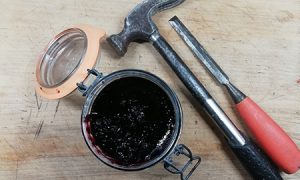
Funny thing, humour. I’ve been having this debate with Rob at work about the comedian James Acaster and whether or not he’s funny. Rob says he is; I’ve yet to see the evidence. Rob won’t let it drop, though, and I’m beginning to suspect he’s trying to jam James Acaster into my life.
It’s a two-faced sort of a word, jam. It can be a sweet, fruity conserve or a sticky situation; something fortuitous or something frustrating. It’s also an improvised playing of music (allegedly from Bing Crosby struggling to clap in time and so ‘jamming’ the rhythm during impromptu sessions with fellow jazz musicians) and, back in the late 70s, it was a word I scribbled on just about anything that came to hand.
It came to mind this week for several reasons. First, two artists in Manchester made the news for stripping naked in the street and smothering themselves in jam. They called the happening ‘The cashier only allowed us 24 jars’. I could have helped them out with a jar of my blackcurrant jam but it probably would have glued them together. I always struggle with the setting point.
Then I went to see Bruce Foxton, former bassist with The Jam, playing in a band called From the Jam – a sort of tribute band with the added authenticity of having a member of the actual The Jam in it. Not sure what you call that but they were good. If you’ve never listened to All Mod Cons by The Jam, do it now. Yes, right now! Forty years old but still as fresh as a daisy.
Finally, my neighbour was shunted from behind by a lorry this morning (he was in his car), causing something of a jam on the level crossing – always an interesting situation. So lots of definitions of jam, but the most surprising thing about jam, apart from how incredibly dense it can become, is its origin.
My assumption would be that jam, as in traffic, must have evolved from jam, as in strawberry. After all, we’ve been preserving fruit for a lot longer than we’ve been sitting in queues on the M25 (although it might not always feel like it). The ancients boiled up fruit to make their food stocks last through the barren winter months and the art of preserving became a cornerstone of cookery long before the Women’s Institute won the war with it.
Following the Battle of Hastings, crusaders bringing sugar back from the Middle East prompted a boom in preserve making and the word jam entered the English language from the French j’aime (I like). Having established itself as a squidgy confection that involves squashing ingredients and packing them into a jar, it later came to mean ‘to squeeze in tightly’ and hence ‘to block’.
In fact, this is all cobblers. I made it up. I had to. No-one knows for sure how the word jam came into use but the records show that it was first used to mean ‘to seize up’ or ‘become wedged’, and from this ‘to squeeze in tightly’. The fruity preserve took its name from this, not the other way round. This all happened relatively recently, within the first 30 years of the 18th century, which prompts the obvious question, what did the English call jam before we called it jam?
“Mother, could you pass the er… the um… the… that stuff?” There must have been so much of this going on back in the Dark Ages.
It’s unusual for a word to be as untraceable as this but the history of the word jam is as impenetrable as my blackcurrant effort. As is the origin of jammy, meaning lucky. “You jammy git.” Great expression, no idea where it came from.
So feel free to come up with your own recipe for the truth and please share it. To be honest, I was put off my research when I started typing ‘jam’ into Google and the predictive search feature threw up James Acaster.
Robert!!


